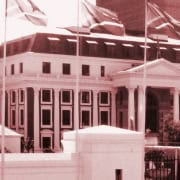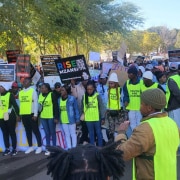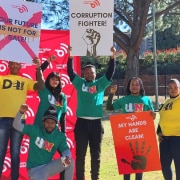|
Getting your Trinity Audio player ready...
|
• Students hold placards during the fees must fall protests. Image: The Conversation.
By Thato Mahlangu
The struggle for young people of colour in South Africa is very much alive. But our struggle is much bigger than what the youth of 1976 fought for. I am not, in any way, taking away what they went through. Their experience was different. We are now fighting economical, psychological, and social wars, including diseases like Covid-19.
Young people of colour have many enemies that they have to fight, some visible and some not. We are expected to triumph. But why must we even fight anything or anyone? In actual fact, we can only do so much to live, let alone protect ourselves and fight for what is ours.
While we have to fight these wars which range from student loan debts, racism, sexism, patriarchy, corrective rape, and colourism, among others, we are still expected to hold our families together, to financially provide for our families in what is now termed black tax. And to be emotionally there for our sisters and brothers and their children, even when they are not there for us.
It is draining.
We can’t move freely in this world without having to look over our shoulders in case someone wants to attack us, take that last money we worked so hard for. We can’t move freely in some spaces because they are still reserved for a group of people whose skin grants them access everywhere. We also need to think about the spaces we move because we fear that we might be confronted by someone who wants to hurt us, to break us by calling us all sorts of slurs just because of the colour of our skin.
What are you doing to help us navigate easily in life?
The privilege some certain people were born with makes it easy for them to move through life while the majority of people are and have been deprived of such. But have you for a moment, paused and thought how I can help to make their stories less painful, more humane and pleasurable? I am not suggesting that you give up your help or bleach the colour of your skin because still you won’t understand where they are coming from. All I am saying is just make it easy for them to be able to voice out their experiences, their opinions. Maya Angelou once said, “There is no greater agony than bearing an untold story inside you,” and there is nothing as painful as dying inside with a story to tell.
If we can be allowed to celebrate and learn about our history in schools and places of higher learning that will help us as young people not to lose our identities. There is room for all people’s history to be included in the curriculum as much as there is room for you to learn about our cultures and heritages.
What should we commemorate 16 June?
There are lots of things we need to celebrate, I agree. I can’t dismiss the heroism of the youth of 1976, even those who came after or before them – fighting an oppressive government, its laws, inequality, and police brutality, among others.
It cost them so much to fight for freedom we are partly enjoying. I say partly because some things haven’t changed, not all freedoms were attained when children and young people died on that fateful day, 16 June.
But should we celebrate the courageous lives that were lost fighting for freedom that should be everyone’s birthright? Lives of children whose mothers and fathers still live in shacks that have illegally connected power cables running on top of their roofs, who live in abject poverty while the promise of an equal and better life never materialised?
I would be ashamed if I was the ruling party that promised people better lives but stole from them instead. They are brave to still host a rally in the names of the same young people they failed. What are they telling their parents and their sisters and brothers who see no change after their loved ones’ blood was spilled in the streets of Soweto, Winterveldt, and Umlazi?
But I hope in our efforts, through dialogues, events, writing poems, and giving lectures or speeches, we can focus on highlighting the struggles the youth of 2020 continue to face. High unemployment, drug addiction, depression, dealing with sexuality, corrupt and selfish leaders, a colonised education that doesn’t speak to us or about us, and others – we fight still. It’s just a different enemy.








